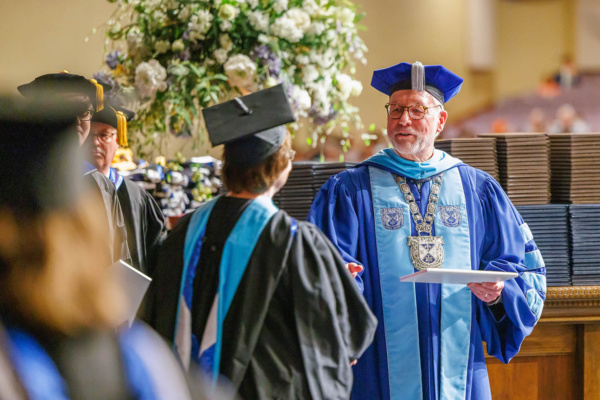In the preceding chapter we considered the city of Ephesus, the beginning of the church there, and the purpose of Paul’s letter to the churches in that area. Now our focus turns to the message of Ephesians. As in many of his writings, Paul divides this letter into two sections. In Ephesians 1–3 he explains magnificent theology. It is one of the richest sections of soteriology—the doctrine of salvation—in all the Bible. Then he builds on this theological truth with the blocks of practical application. Whereas there is only one command in the first three chapters—“remember” (2:11)—the final three chapters contain approximately 40. In light of God’s glorious grace, we must walk a certain way. We have been recreated to reflect Christ.
God’s Glorious Work in the Church by Christ Jesus
The first three chapters of Ephesians are a compelling account of God’s glorious grace in saving the church through Christ Jesus (Eph. 3:21). It is like the Himalayas. There isn’t just one impressive peak but rather an entire range of them. Paul uses the metaphor of wealth to express the splendor of God’s saving work. “The riches of [God’s] grace” (1:7) are an unfathomable treasure. Therefore, the only fitting responses to this grace are to give God praise and glory (1:6, 12, 14) and to exhibit by our lives how amazing God’s grace is. That’s why the last three chapters are Paul’s exhortation to live out this new life in Christ together as the church.
One of the ways Paul describes his message of God’s salvation is as the revelation of a mystery. The Father “made known unto us the mystery of his will” (1:9). In chapter 3, Paul expands this idea, explaining that the unveiled Gospel incorporates believing Gentiles in the sweep of God’s redemption (3:3–4, 9). It was Paul’s divine appointment to “preach among the Gentiles the unsearchable riches of Christ” (3:8). And one of the results of this unfolding mystery is that angelic beings watch with marvel at God’s wisdom displayed in the church (3:10). The dimensions and richness of our salvation are incomprehensible, even to supernatural beings. By Christ Jesus, the Father glorifies Himself in the church and will do so forever (3:20–21).
Our United Life as the Church in Christ Jesus
As amazing as the first half of Ephesians is, the letter does not end there. The truth of the Gospel provides the foundation and motivation for us to live as new people in Christ.
Paul links together his exhortation in chapters 4–6 with the metaphor of walking. It is a simple picture of everyday life. It’s what healthy human beings do. God brings us to life in Christ (2:6) and then prepares a life of good works for us to walk in (2:10).
We naturally want to know what this everyday conduct looks like. So Paul specifies:
- “Walk worthy of the vocation wherewith ye are called” (4:1). Paul explains that God has called us to live out our identity as His church, which entails maintaining unity and growing into the maturity of Jesus Christ.
- “Henceforth walk not as other Gentiles walk” (4:17). In other words, unbelievers characteristically think and act in certain ways that Christians must renounce and avoid. Instead, we pursue new habits that evidence a new identity and a renewed mind.
- “And walk in love, as Christ also hath loved us, and hath given himself for us an offering and a sacrifice to God for a sweetsmelling savour” (5:2). Living out our new life in Christ means imitating His love in our relationships, rather than imitating the world’s sensuality and covetousness.
- “Walk as children of light” (5:8). Christians are transformed, not only from our former behavior (4:25–32) but also from our present culture. “The children of disobedience” live in darkness (5:6–7), so we must clearly distinguish ourselves from them.
- “See then that ye walk circumspectly, not as fools, but as wise” (5:15). As Paul describes in the following verses, by submitting ourselves to God’s Spirit we will display true wisdom in human relationships that are marked by sacrificial love and humble obedience.
This is the kind of life that evidences and enriches our unity in Christ, in whom we have a divine calling, a renewed mindset, a supernatural love and spiritual wisdom.
But it is not without adversity. Living as a new people in Christ brings us into direct conflict with God’s archenemy, the devil. He and his minions, “the rulers of the darkness of this world” (6:12), have schemes (6:11) and “fiery darts” (6:16) by which they intend to wound and defeat us. So the opposition we face is not simply coming from those with an alternate viewpoint. Actually, our calling as the church of Christ Jesus (4:1) entails supernatural warfare. The stakes could not be higher.
Conclusion
After emphasizing the need for unity (4:1–6) and explaining how Christ has gifted His church (4:7–11), Paul summarizes how discipleship takes place. The body of Christ grows into its Head, who is Christ, by truthing in love (4:15). In contrast with the clever deceit of false teachers, we build one another up by living and speaking the truth we have been taught. Teaching and preaching are critical but are not an end in themselves. We must do something with God’s Word by faith. Discipleship is active and involves every member of the body; discipleship is the hands-on ministry of edifying toward maturity.
This maturity is quite practical. Growing into the fullness of Jesus Christ (or putting on the new man) relates to all of life, which means a lot of change needs to occur (putting off the old man). What kind of change would this involve? In what areas do our minds need to be renewed? This transformation involves our speech, our work ethic, our self-control, our ministry to others, our love and forgiveness, and more! Renewed thinking leads to transformed habits as we live out our new life in Christ.
Hear Dr. Pettit’s message on the Message of Ephesians:
Join us for chapel every Monday through Thursday at 11 a.m. EST.








